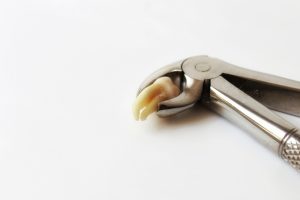It is very common for babies to go through a phase where they cry excessively because of teething. This is definitely not a completely painless process, and their crying really happens for a reason. But it’s a mistake to think that teeth only come in babies or children. Many adults struggle with the eruption of the famous wisdom tooth and may even have problems because of it. But what exactly is a wisdom tooth? Why does it take so long to come in? Does it always have to be removed? These and other questions will be answered in today’s text. Read on to find out!
What is the Wisdom Tooth?
Also known as third molars, wisdom teeth are the last teeth to erupt in a human being. Their eruption usually occurs between the ages of 17 and 21, but there are reports of teeth coming in even after this period. There are four wisdom teeth, two on the bottom and two on the top, one on each side, of course. Because they erupt at a stage when our physical development is almost complete, many people simply do not have enough space in their mouths for them to come in, making their eruption problematic. Another common occurrence is that these teeth erupt incorrectly, which can cause inflammation and several complications for a person.
Why Does the Wisdom Tooth Need to Be Removed?
When a dentist checks a patient’s wisdom teeth, various factors are taken into consideration before deciding whether extraction is necessary. Some of these factors are:
- Whether or not there is space for the wisdom tooth to erupt
- Whether oral hygiene is compromised because of the eruption of the wisdom tooth
- If these teeth tend to become frequently inflamed
- If they “push” other teeth, thus disturbing their alignment
- If they are in contact with the roots of other teeth
It’s also important to note that not all wisdom teeth must always be removed, even though it’s very common that when one tooth erupts improperly, the others do as well.
How is Wisdom Tooth Extraction Performed?
In cases where the wisdom teeth need to be extracted, a relatively common procedure must be performed. First, a dentist applies anesthesia and then begins the extraction process, which can take from 10 minutes in very easy cases, to over an hour in really complicated cases. If a patient needs to have more than one wisdom tooth removed, the dentist may opt to extract all of them on the same day if it’s a simple and quick procedure. For more complicated cases, the patient will need to return to the clinic more often in order for the procedure to be completed. The effects of anesthesia usually last between 4 and 5 hours, and it is normally recommended that the patient neither eat nor drink anything during this time. 
Aftercare Following Wisdom Tooth Extraction
Although it is considered a very simple surgery, it is important to take certain precautions post-operation to prevent inflammation or similar issues. The main precautions are:
- Clean any possible bleeding with gauze to avoid infections
- Use a cold compress in case of swelling
- Avoid very hard foods in the first few days after extraction
- Avoid eating in the first few hours after anesthesia
As you can see, these are very simple procedures but can make all the difference for a successful extraction.
Main Myths About Wisdom Teeth
Because this type of tooth can cause a lot of pain or even greater problems, it is very common to hear stories about what they cause and the dangers they bring. But are all these stories true? Let’s now talk about the main myths about wisdom teeth and explain why you shouldn’t believe these tales. These myths are:
- All Wisdom Teeth need to be removed
- Wisdom Teeth have no Function
- Everyone has Wisdom Teeth
We will go into further detail about each of them separately.
All Wisdom Teeth Need to Be Removed
This is not true. Although there are many cases where wisdom teeth can affect the structure of other teeth or even your bite, it is also common to see people with enough space in their mouths for the wisdom tooth to come in without causing any problems. In these cases, it is very rare that they need to be removed.
Wisdom Teeth Have No Function
It is common knowledge that wisdom teeth were very important at some point in our history, when our diet consisted of roots and harder nuts. These days, the foods we eat are much softer, which meant that, over time, they were no longer as necessary. Still, today wisdom teeth help in grinding food and chewing, as long as they develop well, of course.
Everyone Has Wisdom Teeth
Just as it’s not true that all wisdom teeth must be removed as a preventive measure, it’s also not true that everyone gets them. There are several cases where the teeth simply develop well and do not need to be removed. Wisdom teeth are part of our bodies, and we need to be prepared for the fact that they may eventually cause us some kind of issue. As much as inflamed wisdom teeth cause pain and great discomfort, the extraction procedure is quite simple and effective to eliminate the problem for good. And when this kind of problem no longer exists, we no longer need to worry about it. For this reason, it is also very important to follow all recommendations during the post-operative period.











